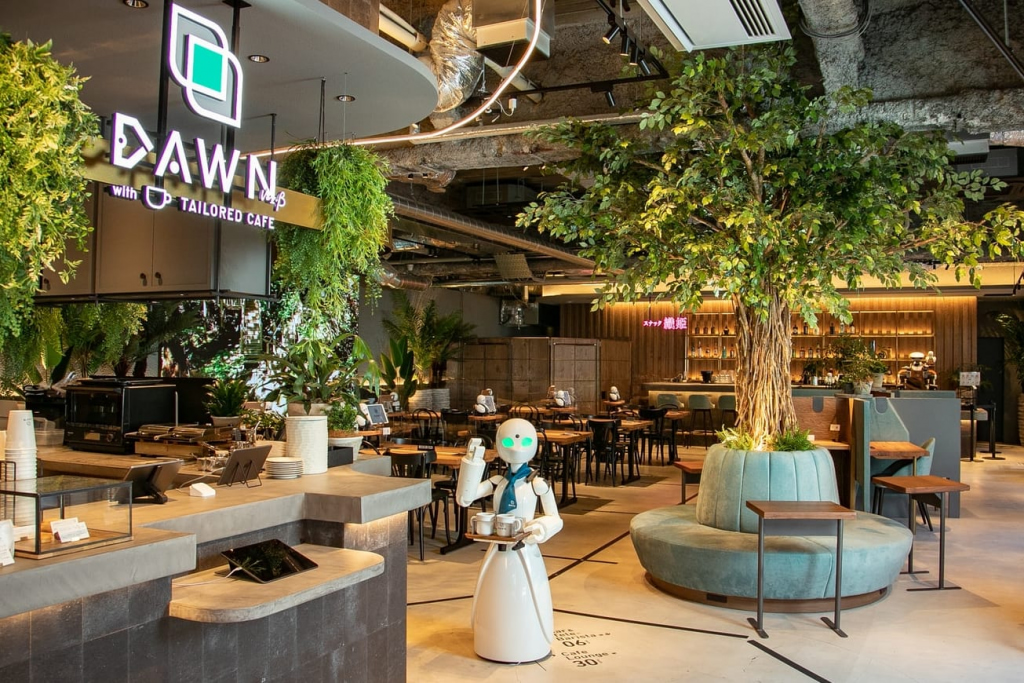Mikako Fujita, 51, was diagnosed with amyotrophic lateral sclerosis, or ALS, on June 21, 2017. By a mere coincidence, it was the Global ALS Awareness Day. “I cried so much, along with my family, that I almost used up the tears for my whole life,” she said.
Fujita currently works as a barista and a waiter at a café in Tokyo’s Nihonbashi district, while fighting the progressive, intractable disease. To put it more precisely, she is not physically present there, but she controls a robotic barista from her home in Aichi Prefecture.
Avatar Robot Café Dawn opened on June 21, 2021, after several trials as a pop-up shop. It is part of an experimental project run by Ory Laboratory to eliminate human loneliness, in their words, by using robots created by the lab’s head, Kentaro Yoshifuji. “I believe people can enjoy their life even after they become bed-ridden,” he says. His robots, called OriHime or OriHime-D, can be operated by using a smartphone or even just with eye movement.
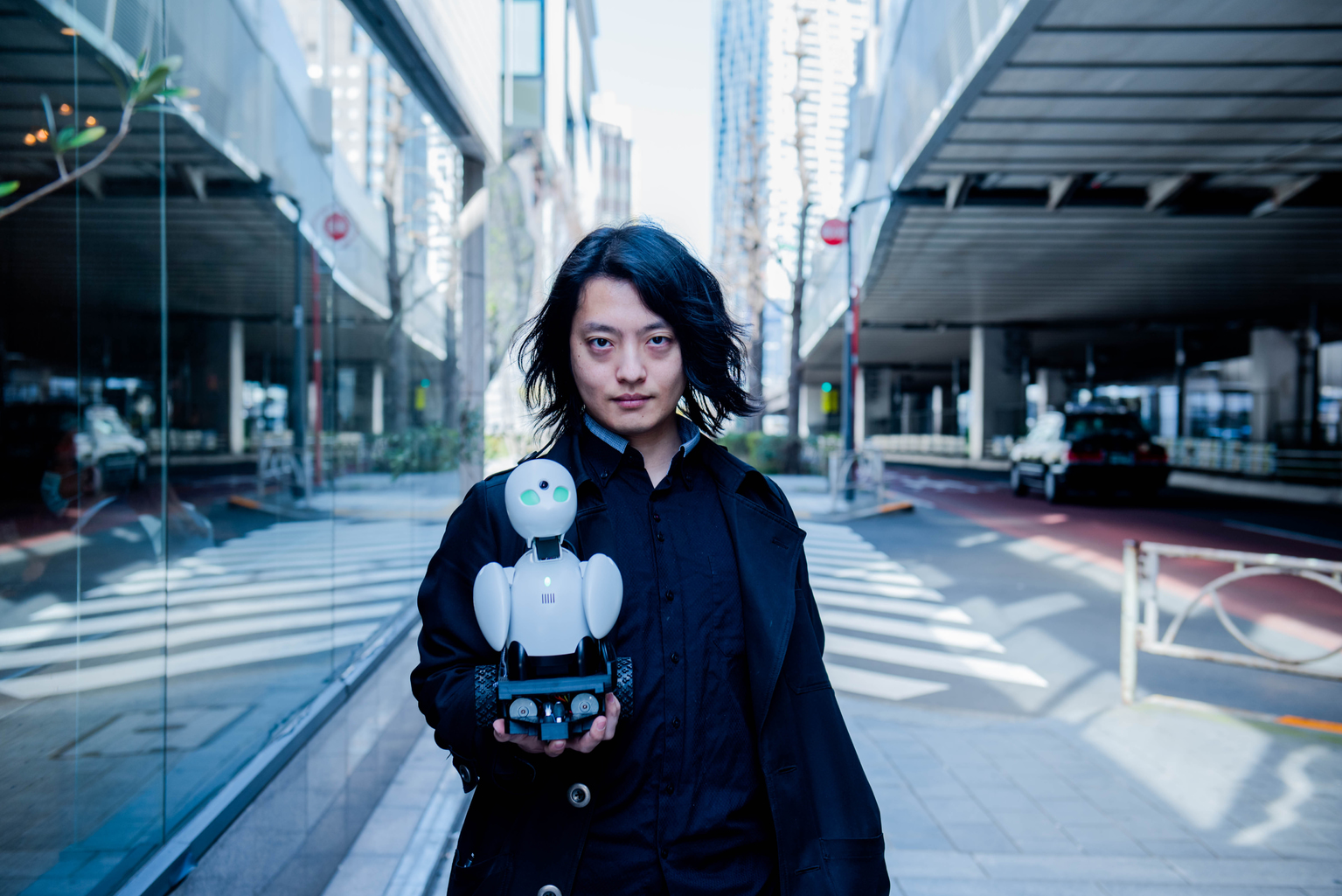
The OriHime robot is the brainchild of Kentaro Yoshifuji
Not Leaving Anyone Behind
Dawn has 70 staff members, called “pilots,” who are home-bound or bed-ridden due to their physical challenges or other reasons. Other than the dining area with reservations preferred, the café has a lounge area with free wi-fi access and table sockets so anyone can just drop by to work on a laptop while drinking coffee. Only cashless payment is accepted.
When guests walk in, a sleek white robot, about the size of a child aged 8 or so, says “hello” waving its arms and flashing its big almond-shaped eyes. Some other robots of the same type glide on the floor, carrying drinks to customers. At each table, a cute, smaller version welcomes diners, displaying the menu on the tablet and taking their orders.
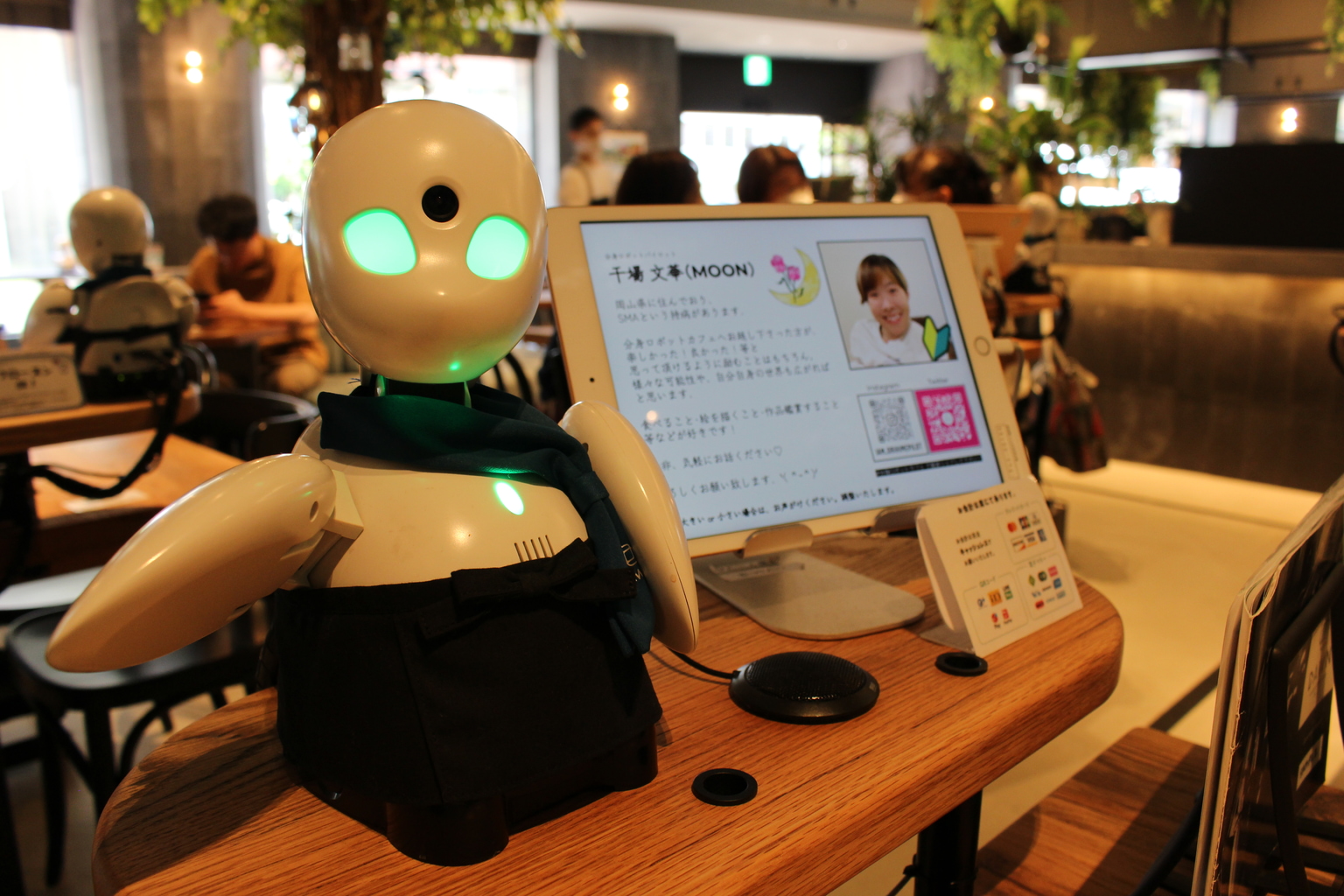
OriHime pilot Ayaka Hoshiba greets diners through the robot.
“Hello. I’m Moon,” a cheerful voice comes from the OriHime robot at the table. Speaking is 19-year-old Ayaka Hoshiba, who operates the robot from her home in Okayama Prefecture. “We recommend the roast beef burger or roast beef plate.”
Hoshiba was diagnosed with spinal muscular atrophy, or SMA, at the age of two. Her muscles gradually weakened and she spent her school life in a wheelchair. “I sometimes feel down, when looking at people around me, because I cannot do things as they do.”
She found out about Dawn on the Internet and took the courage to apply for a job last summer. After undergoing training, she began working in January. “I didn’t think I could [ever] work, so I’m very happy to realize that there are roles I can play.”
Dreams Drive Innovation
At the bar counter in the café is another type of robot called Tele-Barista. Fujita is one of the robot’s “pilots,” and she herself is a professional barista.
She felt something was wrong with her body when she found it difficult to stretch a string of hair elastic. She kept working, but one day, with her hand feeling numb and weak, she spilled coffee in front of a customer. Back then, her company was holding an in-house barista contest and a ticket for a national competition was within her reach. Her symptoms progressed, however, and after being diagnosed with ALS, she quit her job.
“As I spent more time alone at home, I kept thinking about myself and gradually got to hate myself. It was hard for me to think positive,” she recalls.
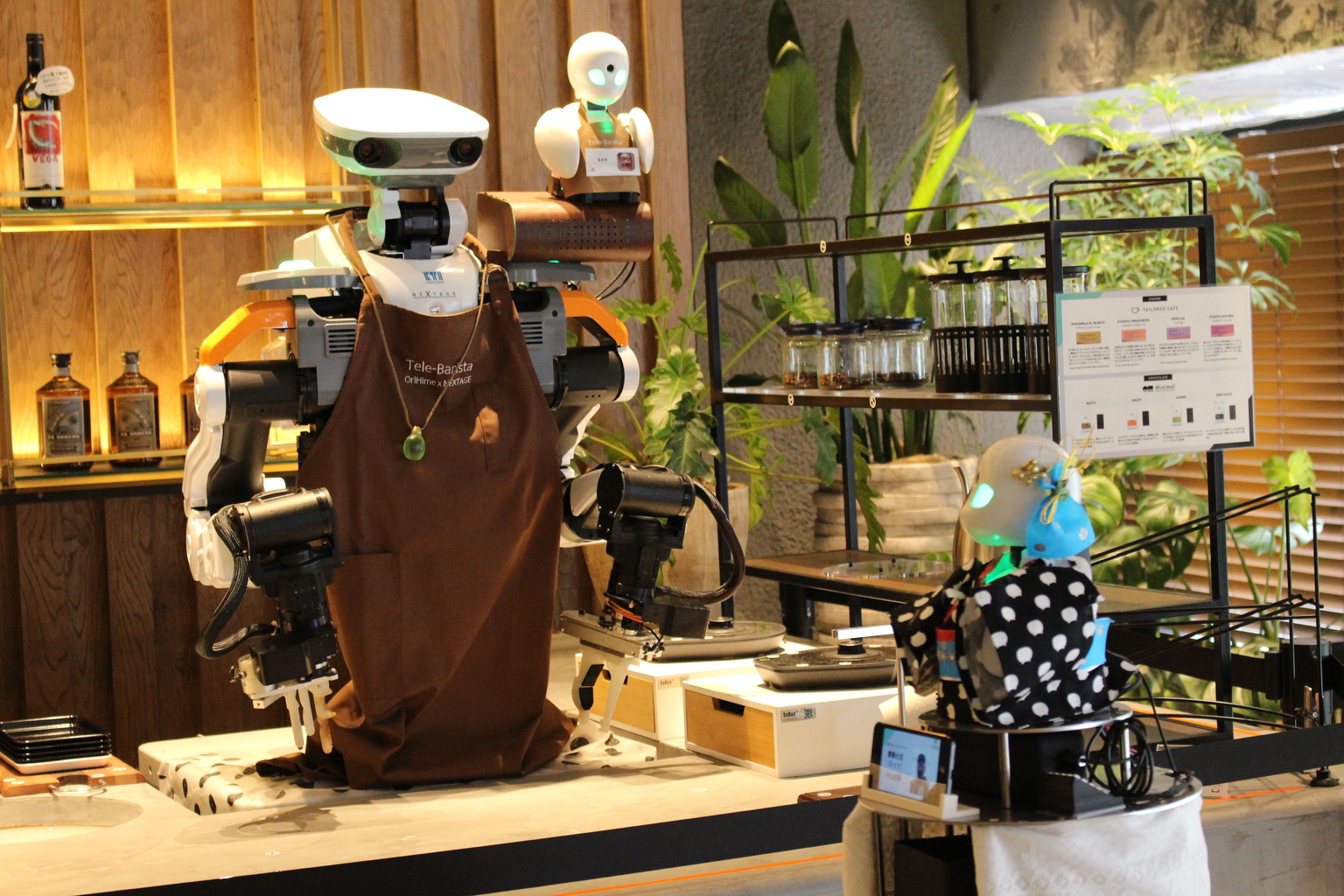
The pilots of Tele-Barista (left) and OriHime (right) having a chat via the robots
About one year later, Fujita found her strong desire to work again. She saw Dawn’s recruitment advertisement on social media and quickly applied to work at the first Dawn pop-up shop. The café did not have the Tale-Barista robot at the time. But her passion to return to work as a barista drove the operator to develop the robot.
At home, Fujita tastes all the coffee beans used at Dawn so she can select the best fit for each customer. “I can move the barista robot just like my hands and I feel as if I myself am dripping coffee,” she says. “I feel saved from a sense of loneliness when I stay connected with people outside, doing something for them and seeing their smile.”
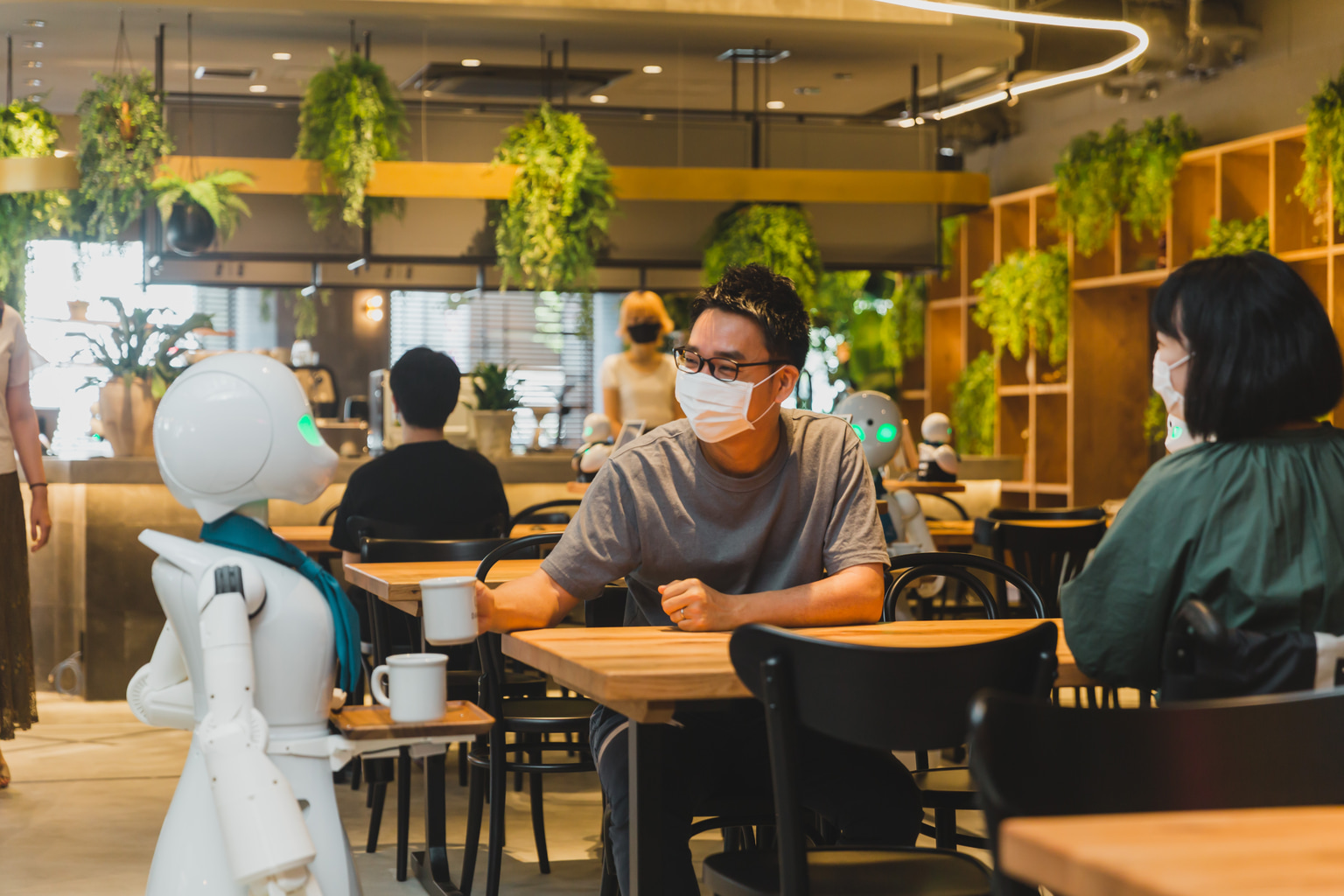
The OriHime-D serves drinks to customers
More Than a Café
Dawn is not just a café but a place for “experiments” to examine ways not to leave anyone isolated. The place sometimes becomes like a soccer field for bed-ridden children to play games by controlling the OriHime robot and at other times a robot rental station for visitors to pick up the mini avatar robots and enjoy Tokyo sightseeing with their home-bound families or friends. Now they’re also creating a virtual staff room for the pilots to gather in the metaverse to share their know-how and experience.
The initiative has also pulled off 30 job matchings for Dawn pilots to work for major companies such as NTT Group and Microsoft.
“Anyone could become bed-ridden as they age, so we call our fellow pilots ‘bed-ridden veterans,” Yoshifuji says. “The question is how to live from that point on without losing self-esteem. We need to remain able to do something for others, not just receiving care. And I want to make that happen.”

